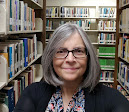I will be attending as one of the 40 students selected to be a Student-to-Staff participant. I will be representing TWU SLIS and am very proud to have been chosen. In return for my free registration and lodging, I have been assigned to work 4 hours a day as a reporter for CogNotes, the conference newspaper. This assignment is an opportunity of a lifetime to hone my skills as a writer. I will be attending sessions and writing articles about what was said.
In my free time, I plan on attending sessions of my choosing, visiting with my vendors, and eating as much free food as possible. To kick off my trip, I will be visiting Universal Studios on Thursday to see Harry Potter World!












